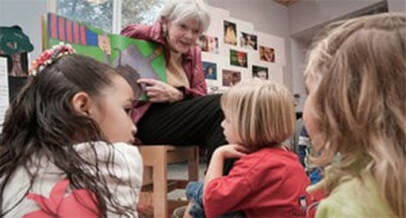As librarians and educators you are aware of the value of exposing children to a wide variety of literacy concepts from birth. Valuable Initiatives in Early Learning that Work Successfully (VIEWS2) is the first research study that validates what you already knew: Storytimes can provide many opportunities to help children develop early literacy skills.
VIEWS2 data showed a statistically significant increase in the early literacy concepts the librarian’s training focused on, alphabetic knowledge and phonological awareness.
The eight early literacy concepts, linked below, could be developed in every storytime. Each concept page includes a link to a tool, separated into three distinct developmental groups, to evaluate the early literary success of your storytimes. There is a video modeling each concept and accompanying tip sheet(s) with additional examples and sample activities.
Visit the concept pages for simple ways to complement ECRR and tweak your storytimes to increase the development of early literacy skills, simplify planning, and boost the joy for you and the children listening.
Research shows that during the first year infants’ brains are developing the neural connections that they will use for language and higher cognitive functions through the rest of their lives. By the time children reach preschool age these developmental pathways are already essentially formed.
Librarians and educators need to embrace every opportunity to make the most of their informal learning environments. Working with early literacy concepts can increase your contributions to strengthening a child’s neural connections, ensuring you make the most of the time you spend with your storytime attendees.
You can guarantee that children have a wide range of educational experiences while enjoying the process of learning. Please contact the VIEWS2 Research Team with any questions and keep up the great work!
VIEWS2 data showed a statistically significant increase in the early literacy concepts the librarian’s training focused on, alphabetic knowledge and phonological awareness.
The eight early literacy concepts, linked below, could be developed in every storytime. Each concept page includes a link to a tool, separated into three distinct developmental groups, to evaluate the early literary success of your storytimes. There is a video modeling each concept and accompanying tip sheet(s) with additional examples and sample activities.
Visit the concept pages for simple ways to complement ECRR and tweak your storytimes to increase the development of early literacy skills, simplify planning, and boost the joy for you and the children listening.
Research shows that during the first year infants’ brains are developing the neural connections that they will use for language and higher cognitive functions through the rest of their lives. By the time children reach preschool age these developmental pathways are already essentially formed.
Librarians and educators need to embrace every opportunity to make the most of their informal learning environments. Working with early literacy concepts can increase your contributions to strengthening a child’s neural connections, ensuring you make the most of the time you spend with your storytime attendees.
You can guarantee that children have a wide range of educational experiences while enjoying the process of learning. Please contact the VIEWS2 Research Team with any questions and keep up the great work!
|
Click here for more information on the eight early literacy concepts:
|

